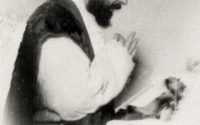Saint Dominic and the Triumph of Grace
 The Mercy of God
The Mercy of God
Today is the feast of Saint Dominic. We are delighted to have sons of Saint Dominic (English and Irish Provinces) among us for the feast. I was mindful of the many Dominican friends who are part of my life, and kept them all in prayer. Saint Dominic would spend whole nights weeping and groaning in prayer before the altar. Over and over again he would say, “What will become of sinners? What will become of sinners?” Saint Dominic’s great passion was to reconcile sinners by preaching the mercy of God.
The Power of Preaching
Dominic understood that the power of preaching comes from ceaseless prayer. His prayer had three characteristics:
-humble adoration,
-heartfelt pity for sinners,
-and exultation in the Divine Mercy.
Saint Dominic prayed constantly; he prayed at home and on the road, in church and in his cell. For Saint Dominic there was no place or time foreign to prayer. He loved to pray at night. He engaged his whole body in prayer by standing with outstretched arms, by bowing, prostrating, genuflecting, and kissing the sacred page. If you are not familiar with the extraordinary little booklet entitled The Nine Ways of Prayer of Saint Dominic, today would be a good day to find it and read it.
 The Psalter of the Blessed Virgin Mary
The Psalter of the Blessed Virgin Mary
Saint Dominic had a tenth way of prayer too: the Psalter of the Blessed Virgin Mary that today we call the rosary. The use of beads was widespread and the repetition of the Hail Mary were both widespread before the time of Saint Dominic. The Hail Mary prayed 150 times in reference to the 150 psalms was practiced in Carthusian and Cistercian cloisters before the time of Saint Dominic.
Irrigated by Grace
Saint Dominic understood that preaching alone was not enough. Preaching has to be irrigated by grace, and grace is obtained by prayer. Inspired by the Mother of God, Saint Dominic interspersed his sermons with the Psalter of the Blessed Virgin Mary. He exhorted his hearers to continue praying the Psalter of 150 Aves as a way of prolonging the benefits of holy preaching. The rosary allows the seed of the Word sown by holy preaching to germinate in the soul and bear fruit.
Simple Means
Divine Wisdom has so ordered things that the simplest material means — humble and adapted to our weakness — produce the greatest spiritual effects. Father Raphael Simon, the saintly Trappist psychiatrist, said that, “five decades of the rosary or even three Hail Marys daily may mean the difference between eternal life and death.” The effect of the rosary is entirely disproportionate to its simplicity. The fruits of the rosary are well known: among them are detachment from sin and from the occasions of sin, peace of heart, humility, chastity, and joy. The rosary, and all authentic prayer, is always realistic — that is to say, honest about human weakness and sin — and, at the same, full of hope — that is to say, open to the glorious plan of God’s mercy.
The Supplication of the Rosary
If Saint Dominic preached the rosary and prayed it, it was because he knew it to be a prayer capable of winning every grace. The rosary is a prayer of repetition. It is a prayer of confidence. It helps one to persevere in supplication, bead by bead, and decade by decade. Our Lord finds the rosary irresistible because His own Mother “subsidizes” it. She stands behind it. The rosary is the voice of the poor, the needy, the downtrodden, and the weak. Persevere in praying the rosary and one day you will hear Our Lord say to you what He said to the woman of the Gospel: “Great is thy faith! Be it done for thee as thou wilt” (Mt 15:28). Saint Dominic shows us that, with the rosary in hand, we will experience the triumph of grace.

